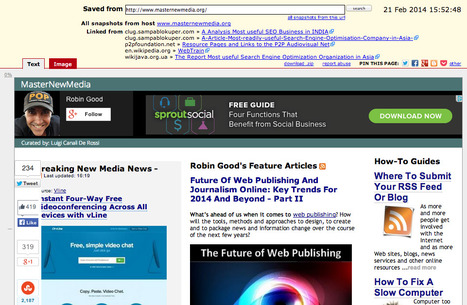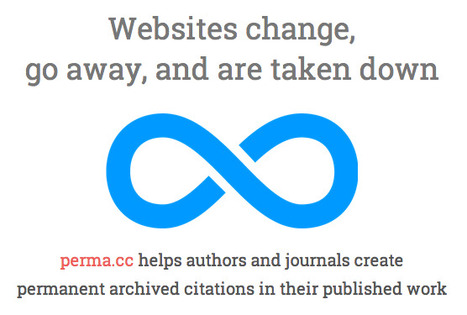Get Started for FREE
Sign up with Facebook Sign up with X
I don't have a Facebook or a X account

 Your new post is loading... Your new post is loading...
 Your new post is loading... Your new post is loading...
|

Blaithan Michael Altenburg's curator insight,
September 24, 2013 3:11 PM
This is good that they are helping 
Prof. Hankell's curator insight,
September 25, 2013 10:33 AM
Robin Good's insight:
Perma.cc is an upcoming web service that aims to help authors and journals create permanent archival copies of their online published content.
Way too often in fact, due to a multitude of reasons, not only content gets moved and relocated to new sites, becoming more difficult to find but in many others it is permanently deleted or lost.
To comfort your doubts that this is a true and tangible issue, you should check the work being carried out by Kendra Albert, Larry Lessig and Jonathan Zittrain, who are completing a study of link rot, available at http://papers.ssrn.com/abstract=2329161. ;
Link rot is the phenomenon by which material we link to on the distributed Web vanishes or changes beyond recognition over time.
Believe it or not half of the links in all of the Supreme Court opinions, don't work anymore.
In this context "the Harvard Library Innovation Lab has pioneered a project to unite libraries so that link rot can be mitigated. We are joined by about thirty law libraries around the world to start Perma.cc, which will allow those libraries on direction of authors and journal editors to store permanent caches of otherwise ephemeral links."
The Internet Archive has provided its powerful archiving engine to support this effort and Cloudfare its distributed CDN.
The official tagline of the upcoming site reads: "perma.cc helps authors and journals create permanent archived citations in their published work"
Here is essence what you should expect from it: "Perma.cc allows users to create citation links that will never break. When a user creates a Perma.cc link, Perma.cc archives a copy of the referenced content, and generates a link to an unalterable hosted instance of the site. Regardless of what may happen to the original source, if the link is later published by a journal using the Perma.cc service, the archived version will always be available through the Perma.cc link."
N.B.: While anyone will be able to go to Perma.cc and archive any web page this resource is designed for researchers, authors and journals. In this light Perma.cc downloads the material at the designated URL and provides a new URL (a “Perma.cc link”) that can then be inserted in a paper. After the paper has been submitted to a journal, the journal staff checks that the provided Perma.cc link actually represents the cited material. If it does, the staff “vests” the link and it is forever preserved. Links that are not “vested” will be preserved for two years, at which point the author will have the option to renew the link for another two years.
My comment: Can't wait to test it. We need these type of archival tools like oxygen. It's not only important that we organize and curate what is important from the web, but it is essential that we also take care in preserving it for the longest possible time.
Free and open to all (soon).
Request beta access here: http://perma.cc/ ;
More info: http://blogs.law.harvard.edu/futureoftheinternet/2013/09/22/perma/ ;
Similar Tools: www.Permamarks.com 
Steve Tuffill's curator insight,
September 25, 2013 11:47 AM
Essential, if the Internet is our all-time library resource... |











Great tool to quickly save web pages, including social media pages with hashtags. Don't forget to grab the bookmarklet and move it onto your browser, too!
This could be handy to use with students looking at how internet based media can change and a story be altered. use this tool to preserve current ate of a story at a particular day/time.
I love the idea of this site-Archive Is-archive any site permanently and access it later. Thanks Robin Good.